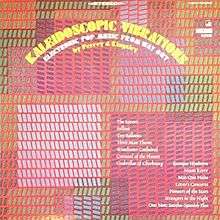Kaleidoscopic Vibrations: Electronic Pop Music from Way Out
Kaleidoscopic Vibrations: Electronic Pop Music From Way Out was a 1967 release of the second collaboration between electronic musicians Perrey and Kingsley. It was released on Vanguard Records, an independent label in Santa Monica, California, as Catalog # VSD-79264. In 1971, it was re-released using different cover artwork and under a new title: Kaleidoscopic Vibrations: Spotlight on the Moog. This album is one of the first to include a track using the Moog synthesizer, that being “The Savers”.[1] This was recorded early 1966 when a friendship started between Jean-Jacques Perrey and Robert Moog, the creator of the Moog synthesizer. Perrey and Kingsley's idea for Kaleidoscopic Vibrations: Spotlight on the Moog was to create an optimistic and humorous feel to their music. In doing so they caught Disneyland's attention, and their song Baroque Hoedown has been the feature song for the Main Street Electrical Parade.[2]
| Kaleidoscopic Vibrations: Electronic Pop Music From Way Out | ||||
|---|---|---|---|---|
 | ||||
| Studio album by Perrey and Kingsley | ||||
| Released | 1967 | |||
| Recorded | 1967 | |||
| Genre | Electronic music | |||
| Length | 32:42 | |||
| Label | Vanguard Records | |||
| Perrey and Kingsley chronology | ||||
| ||||
Production
In 1967, Perrey and Kingsley decided to release a second album as a follow up to their first production, “The In Sound from the Way Out.” Referred to as the “French tape wizard,[3]” Jean-Jacques Perrey and German born Gershon Kingsley used the Moog synthesizer and Ondioline as well as tape, scissors and recordings of acoustic instruments to create "Kaleidoscopic Vibrations: Electronic Music from Way Out." Perrey and Kingsley had used the Ondioline and splicing methods on their first album, but the Moog synthesizer was implemented on this album since Perrey and Robert (Bob) Moog had become friends around the time. Kingsley had also been inspired to use the Moog synthesizer after viewing some in action at a live New York Museum of Modern Art concert. The result of their labor was the fourteen track album that has been used in commercials, TV shows and other settings.
Legacy of the "Baroque Hoedown" Track
The track entitled "Baroque Hoedown" is used as the underlying music in Disney’s Main Street Electrical Parade. In 1971, shortly after the opening of Walt Disney World, the President of Walt Disney Productions was concerned with the little attention being paid to Disneyland, so a project was started to design a nighttime event for the park that would keep visitors into the evening hours. What transpired was the creation of the Main Street Electrical Parade. Disneyland’s Vice President of Entertainment Bob Jani had considered using the symphonic music from the movie Fantasia (as the background music for the parade, but Producer Jack Wagner felt the music should be electronic rather than orchestral.[4] Wagner’s album collection included Spotlight on the Moog: Kaleidoscopic Vibrations by Jean Jacques Perrey and Gershon Kingsley, and the song Baroque Hoedown was chosen because of its ideal tempo for parade choreography.[5] Baroque Hoedown would serve as the musical base the entire parade and the musical rights were quickly obtained by Vanguard Records, though it wasn't until 1980 that the artists realized that their song was connected with a Disney Parade.[6] The parade has had a continual run in Disney’s theme parks worldwide since its premier at Disneyland on June 17, 1972. The song has also been used in other Disney theme park productions, such as Light Magic, Remember... Dreams Come True, and the Paint the Night Electrical Parade.
Track Listing
All songs by Gershon Kingsley and Jean-Jacques Perrey unless noted.
Side One
- "The Savers" - 1:43
- "The Umbrellas of Cherbourg" (Michel Legrand) - 2:42
- "Strangers in the Night" (Bert Kaempfert, Charles Singleton, Eddie Snyder)- 2:56
- "One Note Samba - Spanish Flea" (Jon Hendricks, Antonio Carlos Jobim, Newton Mendonça) - 2:03
- "Lover's Concerto" (Christian Petzold's Minuet in G major (BWV Anh. 114), arr. Sandy Linzer and Denny Randell) - 2:11
- "Third Man Theme" (Anton Karas) - 2:09
- "Fallout - 1:54
Side Two
- "Baroque Hoedown" - 2:24
- "Winchester Cathedral" (Geoff Stephens) - 2:14
- "Carousel of the Planets" (Gershon Kingsley) - 2:39
- "Toy Balloons" (Billy Mure)- 2:04
- "Moon River" (Henry Mancini, Johnny Mercer) - 2:38
- "Mas Que Nada" (Jorge Ben) - 2:19
- "Pioneers of the Stars" (Jean-Jacques Perrey, Andy Badale) - 2:46
References
- ↑ Holmes, Thom. "Moog: A History in Recordings—The First Moog Synthesizer Recordings". Moog Foundation. Retrieved 18 November 2014.
- ↑ Schuster, Fred. "It's a Small World When Perrey Brings Musical Magic to L.A.". The Free Library. Retrieved 18 November 2014.
- ↑ Pinch, T. J., and Frank Trocco. Analog Days : The Invention And Impact Of The Moog Synthesizer. Cambridge, Mass: Harvard University Press, 2004. eBook Collection (EBSCOhost). Web.
- ↑ "Main Street Electrical Parade Premieres at Disneyland". D23.com. The Walt Disney Company. Retrieved 14 November 2014.
- ↑ Dorsey, Don. "The Real Story Behind the Electro-Synthe-Magnetic Musical Sounds of Disney's Main Street Electrical Parade". http://www.dondorseyconsulting.com. Don Dorsey Consulting. Retrieved 17 November 2014. External link in
|website=(help) - ↑ Countryman, Dana (November 13, 2010). The Amazing Life and Music of Electronic Pop Music Pioneer Jean-Jacques Perrey. United States: Sterling Swan Press. ISBN 145386587X.